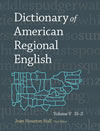Matthew J.X. Malady summarizes readers' comments on his Slate "word aversion" piece — "Which Words Do Slate Readers Hate?", 4/2/2013:
Hundreds of commenters chimed in to report aversions keyed to words extending from apple to zesty. Among the others mentioned: foyer, salad, hose, lapel, plethora, funicular, groin, nostril, and munch. Several commenters noted an aversion to belly. Additional repeating themes included 1) using known word aversion weaknesses to torment and tease siblings, spouses, and other family members, and 2) an uncomfortable commenting posture that amounted to, as PaisleyScribe put it, “shuddering as I type” the offending word.
He ends his list of striking comments with two co-MVP ("most vividly plaintive"?) awards:
In the meantime, I will bid you adieu by ceding the floor to the “Why Do We Hate Certain Words?” commenting co-MVPs. First up is ochnas2, who wins the prize for best description of what it’s like to experience an aversion to the word gorgeous. “I have hated this word as long as I [can] remember. It is a visceral reaction. I wouldn’t say it makes me nauseous, but hearing it gives me the same creepy feeling you would get when you first notice a spider crawling on you that has obviously been there a while.”
And, finally, there’s fsutrill, a “writer/editor/proofreader and bilingual” who maintains a list of aversive words that includes pus, spittle, and putrid. But beyond all others, fsutrill cannot stand the word cigarette, a word that seems so deeply repulsive that fsutrill has never once spoken it aloud. “I’m 43,” fsutrill notes. “Crazy, huh?”
Read the rest of this entry »
 Many Language Log readers are no doubt familiar with the
Many Language Log readers are no doubt familiar with the 

